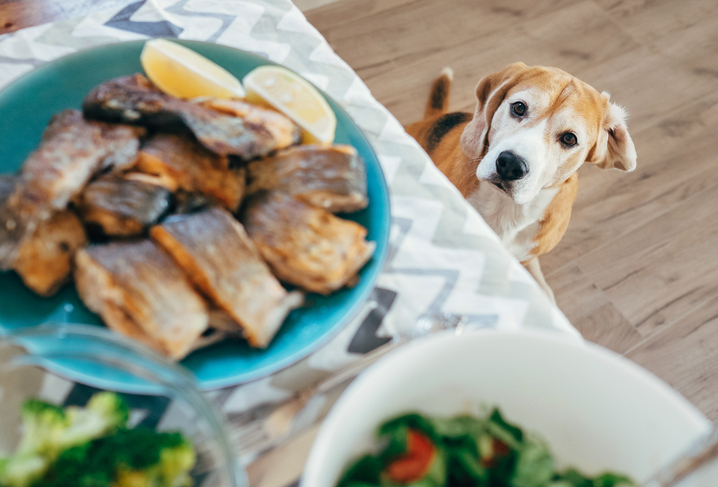Pet Food Safety and Pet Nutrition. We love our pets! And loving them sometimes means giving in to the look for our human food. You know the look! However, some foods are particularly dangerous for our pets and can cause stomach upset, seizures or even death. Be aware of what is toxic and take action to ensure your pets are not digesting dangerous human delights!
Pet Food Safety – A 2025 Guide
Grapes and Raisins: These can cause kidney damage, kidney failure and even death. While not every pet will react the same way, it is best to avoid them.
Artificial Sweeteners: Xylitol, a popular sweetener found in gum, candy and even some diet versions of peanut butter, is deadly. It can causing insulin spikes and drops in blood sugar resulting in seizures, shock and eventual death. Some low fat peanut butters even contain xylitol so be sure to read labels well. Be extra cautious leaving items that contain it in reach of your pet.
Garlic: While controversial because of the possible health benefits for dogs, Garlic has been known to have severe consequences for pets. It can cause the liver to recognize red blood cells as damaged, resulting in anemia, lethargy, difficulty breathing and even death.
Avocados: Avocados are safe for dogs but toxic to birds, cows, sheep, horses and goats. Birds show signs of difficulty breathing and swelling while cattle, sheep, horses and goats can have digestive problems and breast infections from ingestion.
Chocolate: The chemical theobromine is the culprit in chocolate that causes many problems for pets. The darker and purer the chocolate, like baker’s chocolate for example, the higher the level of theobromine. It causes hyperactivity, cardiac arrhythmia, seizures and sometimes death.
Caffeinated Beverages: Coffee, tea and soda containing caffeine are toxic for your pet and her pet nutrition. Large doses cause heart arrhythmias, seizures, vomiting, diarrhea and even coma.
Bacon and Ham: High in fat, bacon and ham can cause vomiting, diarrhea and pancreatitis. Pancreatitis can be very serious and lead to hospitalization.
Cooked Bones: Surprisingly, cooked bones are NOT good for your pet and her pet nutrition. They splinter easily and can puncture the gastrointestinal tract causing peritonitis. The only solution is surgery. If you must feed bones to your pet, feed raw bones. They are available at many local grocery stores from the meat department.
Pitted Fruits: The pits in fruits such as peaches, plums and nectarines contain the poison cyanide. They are also the perfect size for getting lodged in the gastro intestinal tract.
Rhubarb: The leaves of the rhubarb plant can cause a drop in blood calcium levels. This results in salivation, tremors, lethargy, loss of appetite and possibly kidney failure.
Macadamia Nuts: An unknown toxin in macadamia nuts can cause vomiting, weakness, tremors, fever and lethargy.
Onions: Onions contain a chemical called thiosulphate. Thiosulphate causes red blood cells to burst, resulting in hemolytic anemia. Hemolytic Anemia shows up after a few days with symptoms like diarrhea, vomiting, breathlessness, lethargy and sometimes even death.

Sugar: Sugary, high fat sweets are never good for your pet. They can cause pancreatitis and particularly in dogs, lead to diarrhea, decreased appetite, lethargy and abdominal pain.
Raw Fish: Raw fish has been known to cause a Vitamin B deficiency in pets. This deficiency could result in seizures. Fish that are most toxic include salmon and trout. Some fish, like salmon, can also carry parasites that can be deadly if not treated properly.
Raw Meat: While controversial, raw meat can be dangerous if infected with bacteria such as e. coli, or salmonella. If you feed raw meat to your pets, get the highest quality possible to avoid infection.
Dairy Products: After puppyhood, most dogs can no longer digest dairy, being lactose intolerant. Too much milk can cause diarrhea and vomiting. Cheese has less lactose than milk so small bites are tolerable to most pets.

Did you find this article about pet food safety, useful? Would you like 100% free access to more articles like these, and free access to over 5,000 vetted pet care service professionals throughout the United States? Sign up here for a free Petworks account, and take 10% off your first booking, on us!
The Bottom Line On Pet Food Safety
While it’s tempting to share our treats with our pets, think twice about what you are putting in their mouth. What is delicious to us could be deadly for them.
If you want to go the extra mile and hire a professional, you can book a clinical pet nutritionist on Petworks. Dozens of top nutritionists throughout the United States are available to help your beloved pets get and stay healthy.
About the Author: Cyndie Anderson, Owner and Chief Pet Lover at Pooch Pros Pet Care Services LLC

Originally from the Shenandoah Valley, I have been in Northern Virginia for 21 years. I left the corporate world in 2000 to stay at home with my two stepdaughters. After becoming an empty nester I went back to work in retail part time. Once I had done that for about a year I felt like I wanted to do something different. There are two things I am really passionate about: music and dogs. I decided to take my love for dogs and start Pooch Pros Pet Care Services. Having previously worked for a pet sitting service, I knew this would be a perfect fit for me. I now employ 5 independent contractors and we service 45 customers. Mama to two fur babies: Target, a 14-year-old mixed breed and Jeeves, a 9-year-old Maltese.
 In 2021, Dr. Marty Goldstein DVM joined the pet care platform Petworks as an advisor in its Animal Nutrition care division. Dr Marty Nature’s Blend is on a mission to help your pets live their healthiest lives possible. Dr. Marty’s pet nutrition expertise and guidance has helped Petworks evolve and become the preeminent animal and pet nutrition consultation service for pet parents in North America.
In 2021, Dr. Marty Goldstein DVM joined the pet care platform Petworks as an advisor in its Animal Nutrition care division. Dr Marty Nature’s Blend is on a mission to help your pets live their healthiest lives possible. Dr. Marty’s pet nutrition expertise and guidance has helped Petworks evolve and become the preeminent animal and pet nutrition consultation service for pet parents in North America.
 In 2022, Blue Buffalo Founder Bill Bishop Jr. joined Petworks as Senior Advisor in our Animal Nutrition Care Division. Bill brings his extensive expertise in pet food innovation and business leadership. His guidance helps Petworks enhance our pet nutrition service offerings, helping to ensure that pet parents throughout the world receive trusted, science-backed nutritional support for their dogs, cats, and animals.
In 2022, Blue Buffalo Founder Bill Bishop Jr. joined Petworks as Senior Advisor in our Animal Nutrition Care Division. Bill brings his extensive expertise in pet food innovation and business leadership. His guidance helps Petworks enhance our pet nutrition service offerings, helping to ensure that pet parents throughout the world receive trusted, science-backed nutritional support for their dogs, cats, and animals.
 Petworks Co-Founder Kevin Kinyon is a life-long animal lover who works tirelessly to improve the lives of pets and their parents. Human and animal qualities he values most are integrity, humor, and empathy.
Petworks Co-Founder Kevin Kinyon is a life-long animal lover who works tirelessly to improve the lives of pets and their parents. Human and animal qualities he values most are integrity, humor, and empathy.


